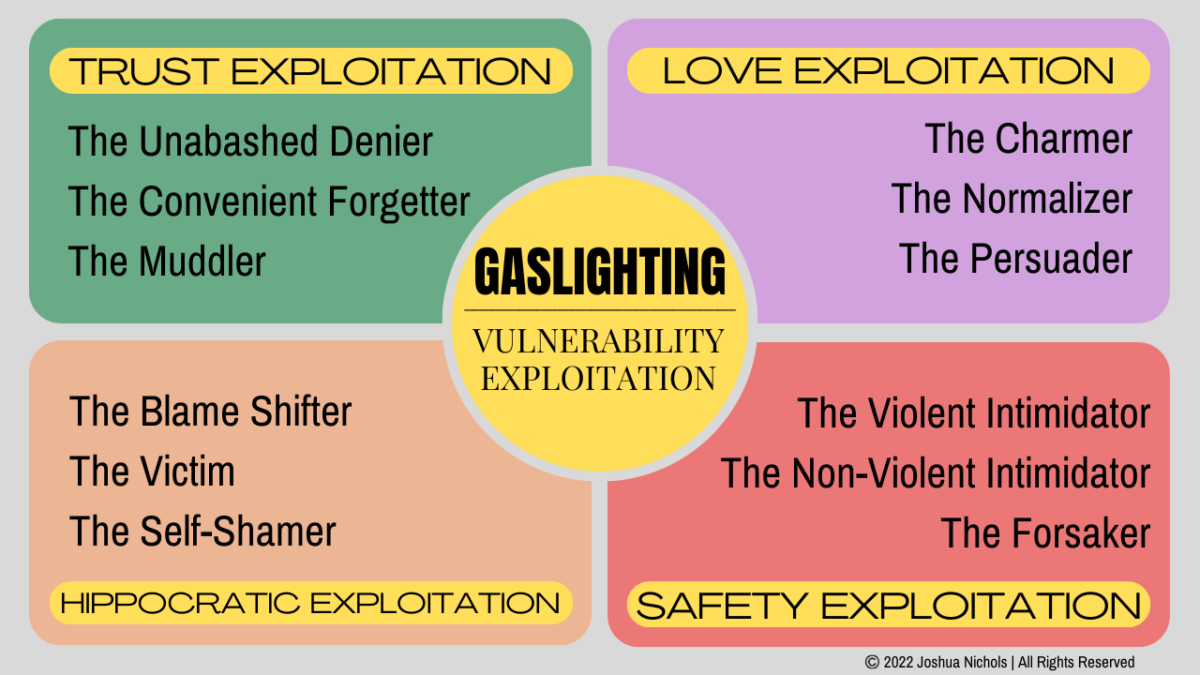by Joshua Nichols, LMFT, CSAT
At this juncture in our culture, most of us know the general concept of gaslighting. For those of you that are doubting your recollection, allow me to jog your memory. Gaslighting is phenomenon where one particular party (i.e., the gaslighter) mischievously attempts to cause another party (i.e., the discerning party), usually someone with whom they are intimately connected to some degree, to question or doubt their own sanity or perceptions of reality. Also known as “crazy-making,” the phenomenon of gaslighting is done through various forms of cognitive and emotional manipulation. Below are a few definitions of gaslighting by various sources:
- [The] psychological manipulation of a person usually over an extended period of time that causes the victim to question the validity of their own thoughts, perception of reality, or memories and typically leads to confusion, loss of confidence and self-esteem, uncertainty of one’s emotional or mental stability, and a dependency on the perpetrator.
Merriam-Webster Dictionary - The word gaslighting is used to describe the emotional and psychological trauma that results when a person is chronically lied to or manipulated by a loved one.
Michelle Mayes, LPC, CSAT-S
Over the last decade as a mental health professional specializing in working with individuals and couples who have experienced sexual infidelity, I have come to believe that gaslighting behavior found in couple relationships impacted by betrayal trauma has one main objective – to manipulate one into questioning their own perceptions of reality in effort to distract or deter said individual from discovering incriminating evidence that could lead to unveiling the dark secrets of the one desperate to keep them hidden.
Although the goal of gaslighting might be singular, the method by which one chooses to accomplish this goal could be many. However, despite the chosen method, the effectiveness of the gaslighting effort is dependent on the gaslighter’s ability to exploit the vulnerabilities of the one being gaslit. In other words, at the heart of this phenomenon is what I call “vulnerability exploitation.”
What Is Vulnerability Exploitation?
In my clinical practice, I often find myself saying, either to clients or other practitioners, that vulnerability is the life-blood of a healthy committed couple relationship. Vulnerability may be what is required for healthy functioning relationships, but it by no means comes easy to us. Making ourselves vulnerable goes against our natural instincts for survival and self-preservation. In my opinion, it is our ability to intentionally and continuously make ourselves vulnerable to one another that truly sets us apart from other species. In other words, our ability to be vulnerable to one another is what makes us human.
In order for a couple to grow closer to one another, each party must first determine that they are emotionally and physically safe with one another. However, just because this level of safety is accomplished by the couple, doesn’t mean their threat detection systems automatically goes offline. No, that part of the brain continually stands guard scanning the environment for potential danger; and partners are more than capable of tripping the alarms of one another. This happens in the healthiest of couple relationships.
When we find ourselves in this situation, which is often emotionally charged, we must work against our natural instinct for self-preservation by quieting our internal alarm and lowering our defenses so that we can respond with love, compassion, dignity, respect and self-respect. One ingredient that needs to be present to some degree in order for couples to do this effectively is trusting that that the partners or spouses will reciprocate an appropriate level of vulnerability in response to the vulnerability shown to them.
When I think of couple vulnerability, I think of words like love, trust, care, compassion, and safety. I believe we, as human beings, experience the deepest forms of trust and intimacy in relation with our life partners. What makes gaslighting behavior so disturbing, in my opinion, is that it is this type of vulnerability that gaslighters look to exploit; thus, vulnerability exploitation is another way to characterize and conceptualize gaslighting behavior as the term itself not only reveals the gaslighter’s playbook, but it also exposes the sinister and destructive nature of that playbook.
Are Gaslighter’s Evil?
After reading the previous section, you might be wondering if all gaslighters are psychopaths and serial killers. I believe it is important to understand that although the behavior associated with gaslighting is dark and sinister to varying degrees, the gaslighter often is not. For many years now as a mental health professional, I have worked in therapy with partners who were skilled in the art of deception in this way; however, more often than not, they are stricken with grief and remorse when they take a deep dive into this phenomenon and discover the pain it has caused someone they truly love. Although sociopaths and psychopaths are not beyond making regular use of gaslighting behavior, authentic guilt and remorse is usually not a typical response when they examine the error of their ways.
Note: Just because it is possible, or even probably, that your partner is not a sociopath, doesn’t mean you should ignore your internal alarm for danger. The injury caused by gaslighting trauma is can be deep and very painful; thus, treatment options should be taken seriously and explored with careful consideration.
Watch the video series below!
About the Author: Joshua Nichols is a licensed marital and family therapist and certified sex addiction therapist. He is co-owner of Family Solution Counseling, a small group practice in Oklahoma City with a primary emphasis in betrayal trauma recovery from a team-approach model. Josh also finds a lot of joy in writing. Other well-received works of his include his article on Reflection Aggression and his two-part series on Mister Rogers and Sex Addiction.

